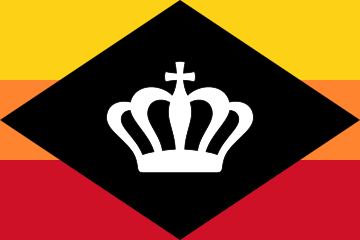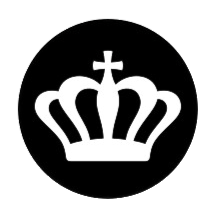Kingdom of Ochoa
Kingdom of Ochoa Ngo Bweina uvu Oko'o | |
|---|---|
| Motto: Nothing Without Work | |
| Map of Ochoa in Aurelia Map of Ochoa in Aurelia | |
| Ochoa Vassals & Districts Ochoa Vassals & Districts | |
| Capital and largest city | Tyrkak |
| Official languages | Anglish, Ne'evuki |
| Ethnic groups | Ochoa, Ne'evuk, O'uk |
| Demonym(s) | Ochoan, Ne'evuki, O'uki |
| Government | feudal monarchy |
• King | Robert Salomon |
• Vassal Duke | Matthew Odell (Ochoa) |
• Vassal Duke | Erik Carwell |
• Vassal Duke | Mason Rhanu |
• Vassal Duke | Curt Nelson |
• Vassal Duke | Jared Pyke |
• Vassal Duke | Elias Jangar |
• Vassal Duke | David Yanthus |
| Legislature | N/A |
| Establishment | |
• Establishment | 11 June 1354 |
| Population | |
• 2020 estimate | 32,649,198 |
• Density | 29.6/km2 (76.7/sq mi) |
| GDP (nominal) | 2020 estimate |
• Total | Ǥ124.76 (Ꞩ249.51) billion |
• Per capita | Ꞩ7,642 |
| Gini (2020) | very high |
| HDI (2020) | medium |
| Currency | Silver (Ꞩ) Gold (Ǥ) |
| Date format | dd/mm/yyyy |
| Driving side | left |
| Calling code | +35 |
| Internet TLD | .och |
The Kingdom of Ochoa, commonly called Ochoa or the Kingdom (or Ne'evuk Oko'o by traditionalists and the indigenous Ne'evuki people), is a feudal monarchy in Aurelia on Eurth.
Etymology
Ne'evuk is the unofficial name of the Kingdom of Ochoa by traditionalists and the indigenous Ne'evuki people. Ne'evuk means "desert civilization" in Ne'evuki, referencing the native tribes of people who dwell in the land. Ne'evuk is a word of great pride for the indigenous tribes; the connotation of the title is that of many mighty warriors surviving the unforgiving desert wilderness. Its meaning has lost significance with non-native Ochoans and O'uks alike, althought Ne'evuki tribes still host sacred ceremonies each year commemorating the arrival of their ancestors into the land.
Geography
Landscape
Climate
Wildlife and Conservation
| Rank | City | Metro area population | State |
|---|---|---|---|
| 1 | - | POP | - |
| 2 | - | POP | - |
History
Ochoan Era: 1354 – 1832
The Kingdom of Ochoa was founded in 1354 by a group of approximately 200 Anglian separatists led by Reinhold Ochoa (the Founders). Their agenda was to form a new government that would have maximum order and simplicity, which they believed could be achieved by limiting citizen input on societal affairs and abolishing public elections. The Ochoans – as they later called themselves – elected Reinhold Ochoa as the first King of Ochoa, forming the Ochoa Dynasty, a feudal monarchy. Although they vied for a Kingdom, they truly believed that it was best for the pursuit of order, peace, and safety; they did not want a dictator, however, and Reinhold did not intend to become one.
As the Ochoans expanded their territory in 1355, they came into conflict with uncontacted native tribes. It took the Ochoans a few years before they could understand the native tongue of the tribes, who they later learned were called Ne'evuk. These Ne’evuki people, the Six Tribes of Ne’evuk, were intrigued by the arrival of the Ochoans but were later angered by their presence and resisted their attempts at expansion and negotiation. Since the Ochoans had brought Great Anglian technology, which was more advanced than the Ne’evuki’s, they were easily able to bring the native tribes into submission. Once the majority of the tribes’ men and women were hushed, with many of the people being slaughtered because they refused to join the Ochoans, Lord Reinhold Ochoa demanded the Ne’evuk become part of Ochoa and adopt its customs. Ne’evuk, seeing no reasonable way out, reluctantly agreed and began to assimilate to established Ochoan customs (see Ne’evuk Accord).
While much is not known about the early history of the Ne’evuki inhabitants, it is known that the entire native and non-native population of the new Kingdom grew rapidly between 1359 and 1408. New births and life expectancy increased dramatically due to the non-native population adapting to the climate and the native population adopting Anglian medicinal and health practices. The population nearly tripled during this time period, which historians now refer to as the Great Blossoming. Many Ochoans married Ne’evuki during this period of time, helping close the gap between the two cultures. Ochoa has a vast population of these mixed descendants called O’uks.
After the reign of Lord Reinhold Ochoa ended in 1375, his son, Lord Henry Ochoa I, divided the Kingdom into seven Vassals so that he could more easily focus on his overall objectives, thus creating more order and control of the affairs of the Kingdom. These Vassal Dukes took many trivial affairs into their own hands and eased the burden of the King’s direct rule over the people. The Dukes reported directly to the King and were held accountable for anything the King deemed fit at the time. This separation of oversight brought with it many challenges: divisions of land, tribes, accountability, and specializations, to name a few. The ultimate power still rested with the King, but the Vassals had authority given them to deal with the affairs of the territory under their influence.
It wasn’t until much later in 1807 that Lord Jeffrey Ochoa mandated that the vassals be divided into three districts each, with District Barons overseeing their daily movements and matters. Since the Dukes were now only responsible for regional objectives, the Barons were now entirely responsible for the overall performance of their districts, mainly in terms of production output and resource management. If anything was amiss in the Kingdom, the ruling King would know exactly who to go to. This brought with it more order and stabilization, which was (again) the original goal of the Founders.
Severed Line Era: 1832 – current
In 1832 the Ochoa Dynasty was dissolved due to a successful coup led by Byron Wilthemore (see Wilthemore Insurrection), ending the Ochoan Era and ushering in the beginning of the Severed Line Era (1832 – current). He seized the crown and thus became the first illegitimate King to rule in Ochoa. Lord Byron Wilthemore brought the country into a new age – although unstable – renaming the original Dynasty as the ‘Kingdom of Ochoa’. From this time forward, Lord Byron Wilthemore mandated that Ochoa was not to be ruled by a pure descendant of Lord Reinhold Ochoa, deeming it an illegal act for an Ochoa to be in any position of authority (see Ochoa Burial). During the late 1830s, Wilthemore authorized the public murders of all known Ochoa family members (see Ochoa Line Massacre). Believing the Ochoa family line to be destroyed, he turned his attention to other matters pertaining to ruling a Kingdom.
During the last few years of Wilthemore’s reign, his grip on society and the military weakened greatly and another coup looked imminent. A man named Edward Salomon I thought that he could bring extreme order to the affairs of the Kingdom. Because of the rocky political climate, he was successful in his aims. After successfully obtaining the throne, his first act toward stability was the public execution of Lord Byron Wilthemore and the current Dukes and Barons (see Power Move of 1857). This blazing taking of lives, he thought, would represent his dominance and serve as a stark portrayal of his new reign and that of House Salomon. Ochoa was not to be a free Kingdom, but one without disorder and chaos by whatever means necessary. This message is imprinted on the minds of Ochoans still today.
This execution was the first of thousands more to come. House Salomon is known for its blatant disrespect of cultures and traditions and its methodology of cruel dominance. Salomon Kings have been known for their subtle control of resources, corporations and media outlets among other things pertaining to authoritarian rule. Although they profess good intentions, they care more about keeping the Salomon line in power while enjoying watching the psychological effects of their public and private dealings on their subservient citizens.
From 1968, when Lord Richard Salomon ascended to power, the military has had a complete overhaul as well as new mandates abolishing most of what the original Ochoa line Kings hoped to achieve (see Salomon Mandates). These Salomonian mandates make up the entire law; nothing current is in force that has not been altered, created, or destroyed by House Salomon since 1968. Everything that was law, everything in historical documents, every mention of Ochoa family members, has been destroyed by Lord Richard Salomon and his son, the current King, Lord Robert Salomon. They seek to create a new order under their rule, taking the nation in a whole different direction from the Founders’ original objectives and hopes.
Since Lord Robert Salomon’s rise to power in 1993, Ochoa’s economy was bolstered by the formation of the Sanctioned Central Bank of the Kingdom of Ochoa, or Central Bank for short, in 2004. Owning the entirety of the bank, the Kingdom Investment Bureau - the government branch that oversees all investment activity inside and outside the nation - is where 84.6% of government funding comes from. The Central Bank brought many foreigners into the country on work visas (see Immigration); the government saw not only an influx of people and cash but the creation of more Kingdom bureaus during this period. During the year-long influx of workers, the population grew by 2.1% and saw a rise in overall well-being of citizens.
Less than a decade later brought what was termed "The Great Drought of 2013" - a massive trial for the nation. The drought lasted for eight months during 2013 and saw a decline of 17% of its watersheds and the drying up of some small fishing reservoirs. Thousands of the elderly population perished during this awful time, the non-native Ochoans being hit the hardest due to their lesser history of physiological acclimation to the climate. The major Ne’evuki tribes saw this as an opportunity to increase public favor by conducting nationwide water seminars showcasing their ancestral methods of locating, treating, and storing water during exceptionally dry periods. These seminars were also used to teach non-natives how to train their bodies to function with less water in their systems. Ultimately, the seminars had a desirable effect on national morale and caught the attention of one of the vassal dukes, Duke Matthew Odell (Ochoa), who later became overseer of the nation’s water supply.
From 2014 onward, relative economic stability and growth occurred, whereas satisfaction with the quality of life decreased. Increasing population, less water, more pollution, and climate change all contribute to the public’s general dissatisfaction with Ochoan life, adding to the fact the general distrust of the government.
As of 2022, general sentiments have not changed and history is still being written.
Politics
Government
Administrative Divisions
Policies
Foreign Relations
Military & Law Enforcement
Economy
Taxation
Income Tax
Property Tax
Nation Tax
Imports
Lithium
The Kingdom requires lithium to erect and maintain its solar power infrastructure. Its lithium imports come from the nearby nation of Zaxar, a major exporter of the resource.
Spices
Information Technology
Exports
Mined Minerals
Ore
Coal
Jewelry
Water Treatment
Solar Power
The Kingdom is a major exporter of solar power. Electric utilities sourced from the panels are sold to nearby nations.

